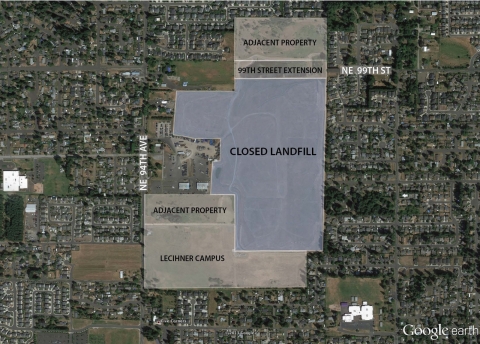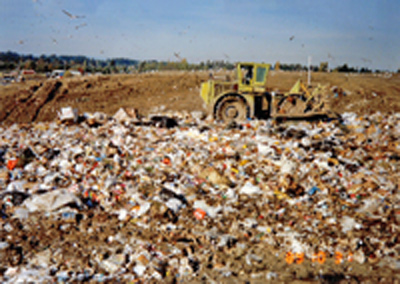Clark County has completed the first phase of the master plan that will guide decisions about the future use of county-owned property at 9411 NE 94th Ave. The county agreed to purchase the 120-acre site from private owners in December 2012, with the intent of encouraging job creation on a 30-acre portion of the property zoned for light industrial development. A 74-acre portion of the property, which encompasses the closed Leichner Landfill, will be included in the master planning process, but its redevelopment will be limited for at least five to 10 years because of the constraints of environmental regulations.
The county and a team of experts studied the entire 120-acre site and analyzed potential reuses, considering market demand and environmental effects. The master plan process did not determine what specific uses will be developed at the site. Instead, the plan provides a conceptual design identifying where buildings and roads and other infrastructure might be located to support future development. Typically, such a plan assumes a site develops in phases over several years.
Leichner Landfill history
The Leichner Brothers Land Reclamation Corporation began receiving garbage and other waste at the site in the late 1930s. Garbage was burned and buried for almost 50 years until environmental studies found that decaying wastes from the unlined landfill had contaminated groundwater. In 1987, the Washington State Department of Ecology issued a consent decree that required the landfill owners to stop further groundwater contamination and clean up the site. The landfill closed completely in 1991. Clark County and the city of Vancouver joined the property owners in the cleanup effort with an eye toward the future purchase of the site for beneficial public uses.
The cleanup included covering the 74-acre landfill with a layer of dirt, followed by a thick membrane liner and a second layer of dirt to keep precipitation out of the landfill. This process is called “capping” the landfill. The property owners also installed a system to control methane gases generated by decaying garbage and groundwater monitoring wells to track the amount and spread of any contamination. Since the mid-1990s, methane production and groundwater contamination have decreased significantly.
The site is currently managed under a consent decree with the Washington State Department of Ecology. That legal document includes a deed restriction that prohibits any future use of the 74-acre capped landfill area that could breach the cap and cause additional groundwater contamination. The master plan will consider these constraints when determining potential future uses for the landfill portion of the property. The constraints do not rule out some form of future public use.
The 30-acre parcel at the south end of the landfill does not have the same level of regulatory constraints and offers the greatest opportunity for a range of future uses. This site was the source for much of the soil used to cap the landfill and does not have contamination or cleanup issues.
Planning process
The first phase of the master planning process focused on the 30-acre parcel formerly owned by the Koski family. The planning process explored a range of potential uses for this area, with emphasis on future development that would be a good fit for the surrounding neighborhood and potentially create new jobs.
The master planning process included studies analyzing land use, environmental, transportation and infrastructure needs to serve development. A fiscal analysis assessed the market demand for the types of businesses and uses that might locate at the site.
The county hosted three open houses in the neighborhood to gather feedback from residents. The 94th Avenue Improvement Project underwent a similar public process prior to implementing the road project. Nearby residents identified increasing traffic from new development in the immediate area as the top concern for both projects. Neighbors were also concerned about the visual impacts and the types of development that might be allowed.
Plan approval and conditions
The plan was approved by Clark County Community Development on June 28, 2018. The area in the master plan is now referred to as the Leichner Campus properties. The planning team included several conditions in the approved plans. These conditions were established to respond to the neighborhood's concerns regarding traffic, visual impacts and the types of businesses allowed:
- Traffic concerns will be addressed by allowing only one access to the site at 88th Street and installing a signal at the intersection of 88th Street and 94th Avenue to meter traffic flow.
- The south and east sides of the development are required to have a 30-foot vegetative buffer to visually screen the neighbors. The buffer will consist primarily of ground cover, shrubs and trees of varying heights.
- Building height is restricted to less than 50 feet.
- Certain business types, including chemical manufacturing, rendering and solid-waste handling facilities, are not allowed.
Looking ahead
The Clark County Council authorized the county manager on Nov. 6, 2019 to execute a purchase and sale agreement with the city of Vancouver for the county-owned Leichner Campus properties. The Leichner Campus consists of approximately 30 acres of clean, light industrial property adjacent to the closed Leichner Landfill. The property is west of 94th Avenue, just north of 88th Street. The estimated sale price is $7 million. An appraisal process will determine the final value of the property.
Negotiations for the sale of the property began in October 2018 when the city of Vancouver identified the Leichner Campus as the most centralized location for constructing a new public works facility. Two other sites were considered, but the city deemed the locations to be impractical for the new public works facility.
The city and county expect to close the sale of the property in late December or early 2020. The proceeds from the sale will be deposited in the Leichner Landfill Financial Assurance Reserve Fund. The fund is used to monitor and maintain the closed landfill.
For more information about the site development plans, visit the city of Vancouver's website.
The second phase of the Leichner master plan will focus on future uses of the landfill itself. Initial review of potential reuse of the landfill has focused on some form of recreational use that will not impact landfill operations or damage the landfill cap. No timetable has been established for implementing the second phase. Funding for the next phase is dependent on revenue from the sale of the Leichner Campus properties.

